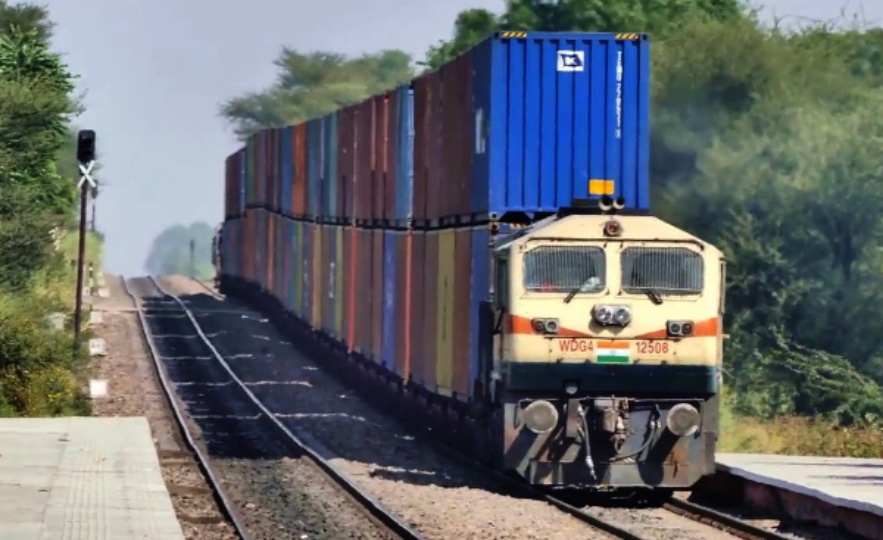
Freight train operations increases by 60% from last year, 2 corridors 96% complete
NEW DELHI : A 60 percent rise in Freight Train Operations from last year with 325 good trains running daily on two dedicated freight corridors which are now 96.4 percent complete, a senior railway official has said. Dedicated Freight Corridor Corporation of India Limited’s Managing Director R K Jain said that more than two lakh trains in total have run since the inception of the project and today more than 10 percent of freight on the Railways is handled by these two corridors.
The 1,337-km-long Eastern Dedicated Freight Corridor (EDFC) runs from Ludhiana (Punjab) to Sonnagar (West bengal) and the 1506-km-long Western Dedicated Freight Corridor (WDFC) connects Dadri in Uttar Pradesh with Mumbai in Maharashtra.
“This 2843-km-long engineering marvel, passing through 56 districts in seven states of the country is now 96.4 percent complete. Currently, we are running on an average of 325 trains per day which is 60 percent more than last year,” Jain said, sharing a progress report on the DFCCIL with mediapersons.
“The EDFC is now 100 per cent complete and operational with feeder routes to different coal mines and thermal power plants. The WDFC is also 93.2% complete with feeder routes serving various cement plants and the large ports of Mundra, Kandla, Pipavav, and Hazira in Gujarat,” Jain added.
DFCCIL officials say that with the project’s announcement in April 2005 by then prime minister Manmohan Singh and its dynamic progress during the 10 years of the Modi government, it has come a long way to become a game changer in the country’s transport logistics.
They say that Indian businesses need affordable logistics to keep their product cost-competitive and rail freight is the most cost-effective and environmentally friendly transportation option.
“The Dedicated Freight Corridors (DFC) have been envisaged to ensure reliable, economical and faster transportation of goods,” Jain said. Talking about the challenges in the completion of the project, Jain said 11,000 hectares of land was to acquired across the seven states. “This is equivalent to 22,000 football grounds. The biggest challenges were in dealing with different land laws, local issues, law and order etc.”
“The project has 62 important bridges, 535 major bridges, 4,643 minor bridges, 53 rail flyovers on passenger railway tracks, 304 roads over bridges, 557 roads under bridges, and 48 junctions among several other features,” he said.
Highlighting the advantages of the two corridors Jain said that besides decongesting passenger tracks by shifting freight trains to DFC tracks and increasing the punctuality of passenger trains, the two functional corridors have reduced logistics costs with faster trains and reduced transit time of goods.
“Augmenting capacity via special tracks with higher load-bearing capability, boosting exports using double-stack container trains and facilitating the growth of Gatishakti Cargo Terminals along with Multi-Modal Logistic parks, the project has enhanced the overall industrial competitiveness,” Jain said.
“While the dedicated freight corridors also contribute to employment generation, it has further boosted key government initiatives such as Make-In India, Start-Up India, PLI Schemes etc. making India a developed country by 2047,” he added.
The New Rewari Chord Line (1.22 Km) commissioned on July 14, 2024 is saving 36 precious crew hours per day and reducing 1.5 hrs of transit time of coal trains, he said.
“The two Gatishakti Cargo Terminals have been commissioned at Rewari and Bhaupur while three more have been notified at Daudkhan, Saradhana and Gothangam,” Jain said.
He added, “Four new running rooms coming up at DDU, Khurja, Kanpur and Palanpur have been made which will improve crew efficiency. Similarly, electrical upgradation over the New Khurja-New Saharanpur section will accommodate more electric trains and new two longer loops planned at New Phulera will accommodate mor e trains at the junction.”
Incorporated in 2006 under the Railway Ministry, the DFCCIL is a Special Purpose Vehicle for the construction, operation, and maintenance of the dedicated freight corridor

